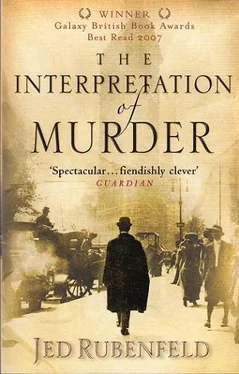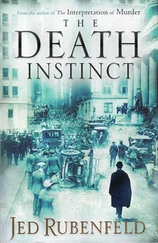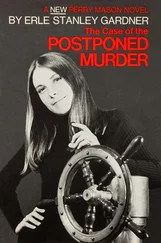Jed Rubenfeld - The Interpretation of Murder
Здесь есть возможность читать онлайн «Jed Rubenfeld - The Interpretation of Murder» весь текст электронной книги совершенно бесплатно (целиком полную версию без сокращений). В некоторых случаях можно слушать аудио, скачать через торрент в формате fb2 и присутствует краткое содержание. Жанр: Исторические приключения, на английском языке. Описание произведения, (предисловие) а так же отзывы посетителей доступны на портале библиотеки ЛибКат.
- Название:The Interpretation of Murder
- Автор:
- Жанр:
- Год:неизвестен
- ISBN:нет данных
- Рейтинг книги:5 / 5. Голосов: 1
-
Избранное:Добавить в избранное
- Отзывы:
-
Ваша оценка:
- 100
- 1
- 2
- 3
- 4
- 5
The Interpretation of Murder: краткое содержание, описание и аннотация
Предлагаем к чтению аннотацию, описание, краткое содержание или предисловие (зависит от того, что написал сам автор книги «The Interpretation of Murder»). Если вы не нашли необходимую информацию о книге — напишите в комментариях, мы постараемся отыскать её.
The Interpretation of Murder — читать онлайн бесплатно полную книгу (весь текст) целиком
Ниже представлен текст книги, разбитый по страницам. Система сохранения места последней прочитанной страницы, позволяет с удобством читать онлайн бесплатно книгу «The Interpretation of Murder», без необходимости каждый раз заново искать на чём Вы остановились. Поставьте закладку, и сможете в любой момент перейти на страницу, на которой закончили чтение.
Интервал:
Закладка:
In the light of the electric lantern, they could see an expensively furnished man's study. Bookshelves lined the walls, although, instead of books, the shelves were filled with a collection of scale models of bridges and buildings. In the middle of the study stood a massive desk with brass lamps on it. Littlemore switched on a lamp. Quietly, Littlemore and Betty left the study and walked down a hallway. They crossed a white marble entry foyer. Then they heard a muffled noise. Farther down the hall, past the most spacious living room either Littlemore or Betty had ever seen, a door was rattling, its knob turning back and forth. Someone was evidently behind the door and trying in vain to open it. Littlemore called out, identifying himself as a police detective.
A female voice answered. 'Open the door. Let me out.'
It did not take Littlemore long to do so. When the door opened, a linen closet was revealed, as was the back of a woman, pressed into a space not intended for a person, her hands tied behind her. Mrs Clara Banwell turned around, thanked the detective, and begged him to untie her.
Sweat glistened on Henry Kendall Thaw's forehead as he eyed the policeman on the other side of Gramercy Park, patrolling back and forth under the gas streedamp in front of the Actons' house. It dampened the back of his shirt below his dinner jacket. It trickled down his sleeves and trousers.
From his vantage point on East Twenty-first Street between Fourth and Lexington avenues, Thaw could see the entire row of imposing houses that lined Gramercy Park South. He could see the Players Club, lit up gaily on a Friday night. Indeed, he could see behind the translucent curtains of the club's first-floor windows, where well-heeled older men and bare-shouldered young women passed to and fro, drinking Duplexes and Bronx Cocktails.
Thaw's eyes were better than Jung's. He detected, three stories above the patrolman, a movement on the Actons' roof. There, against the night sky, he discerned the silhouette of another policeman and the outline of the rifle he was carrying. Thaw was a wiry man, thin almost to the point of appearing frail, with arms slightly longer than they should have been. His face was surprisingly boyish for a man in his late thirties. He might almost have been handsome, except that his small eyes were a little too deep-set and his lips a little too thick. Whether in motion or stationary, he seemed unable to catch his breath.
Thaw was now in motion. He walked east, keeping to the shadows. He pulled the brim of his hat even farther down as he crossed Lexington Avenue: he knew the house on this corner very well. He had watched it for hours at a time in the old days, waiting to see if a certain girl would come out of it, a pretty girl he wanted to hurt so much it made his skin tingle. He skirted the iron fence of the park until he came to its southeastern corner, with Irving Place separating him from the watchful policemen. The officers never saw him enter the back alley behind the houses of Gramercy Park South.
Two miles away, in his apartment on the second floor of the small house on Warren Street, Coroner Charles Hugel had packed his bags. He stood in the middle of his living room, biting his knuckles. He had delivered his letter of resignation to the mayor. He had notified his landlord. He had gone to the bank and closed his account. All the money he possessed lay before him, stacked in neat piles on the floor. He had to decide how to carry it. He bent down and started counting the bills — for the third time — wondering whether it would be enough to establish him in another, smaller town. His hands jerked open and fifty- dollar bills flew into the air when he heard the pounding on his door.
If the patrolman in front of the Actons' house had only looked up, he might have noticed a deeper darkening at the window of Nora's bedroom. He might possibly have realized that a man had passed behind its curtains. But he didn't look up.
The intruder loosed the white silk tie that was around his neck. Silently, he drew the tie from his collar and wrapped its ends around his hands. He closed on Nora's bed. Despite the darkness, he could make out the girl's sleeping form on the bed. He could see the line where the pretty chin gave way to her soft, unprotected throat. Slipping the tie between headboard and pillow, he worked it downward, slowly downward, beneath the pillow, closer and closer to the girl's neck, infinitely slowly, until its two ends should emerge out from under the pillow. He listened all the while to her breathing, which went on softly, undisturbed.
It is a fine question whether the kitchen knife, had Mrs Mildred Acton not removed it from beneath the girl's pillow, could have done any good. Could Nora Acton, jolted awake by a man in the night, have reached the knife? If she had reached it, could she have used it? Nora always slept on her stomach. Even if she had got her hands on the weapon, could she — with her breath choked off — have saved her life with it?
All fine questions, but all quite academic, since not only was the kitchen knife not there, neither was Nora.
'Put 'em up, Mr Banwell,' said a voice from behind the intruder at Nora's bed. An electric lantern, held by a uniformed officer standing in the doorway, suddenly lit up the room. George Banwell threw his hands before his face.
'Step away from the bed, Mr Banwell,' said Detective Littlemore, jutting the muzzle of his gun into Banwell's back. 'Okay, Betty, you can get up now.'
Betty Longobardi rose from the bed, fearful but defiant. As Littlemore patted down Banwell's pockets, he glanced at Nora's hearth. There, as he expected, a wall panel had swiveled open, revealing a secret passageway behind it. 'Okay. Put your hands down now. Behind your back. Nice and slow.'
Banwell didn't move. 'What's your price?' he asked.
'More than you can pay,' answered Littlemore.
'Twenty thousand,' said Banwell, his hands still over his head. 'I'll give each of you twenty thousand dollars.'
'Hands behind your back,' repeated Littlemore.
'Fifty thousand,' said Banwell. Squinting into the beam of light, he could see there were two men in the doorway, one holding the lantern and another behind him, in addition to whoever had the gun sticking in his back. At the words 'fifty thousand,' the two men in the doorway shifted uneasily. Banwell addressed them. 'Think of it, boys. You’re smart; I can tell by the look of you. Where do you think Chief Byrnes got his? You know what Byrnes has in the bank? Three hundred fifty thousand. That's right. I made him rich, and I'll make you rich.'
'The mayor won't like your trying to bribe us,' said Littlemore, lowering one of Banwell's arms and placing a cuff around his wrist.
'Are you going to listen to this fool behind me?' Banwell shot out, still addressing the two men in the doorway, his voice strong and confident notwithstanding his predicament. 'I'll break him during the trial. I'll break him, do you hear me? Be smart. You want to be poor your whole lives? Think of your wives, your children. You want them to be poor their whole lives? Don't worry about the mayor. I own the mayor.'
'Do you, George?' said the man behind the officer holding the lantern. He stepped into the light. It was Mayor McClellan. 'Do you really?'
Littlemore snapped the handcuffs over Banwell's other wrist, the lock catching with a satisfying click. With a quickness surprising for a man of his size, Banwell wrenched himself out of the detective's grip and, arms locked behind his back, made for the passageway But he had to stop and duck to get in, which was his undoing. Littlemore had his gun in his hand. He had a clear shot but didn't fire. Instead he took one large step forward and brought the butt end of his gun down on Banwell's head. Banwell let out a cry and collapsed to the floor.
Читать дальшеИнтервал:
Закладка:
Похожие книги на «The Interpretation of Murder»
Представляем Вашему вниманию похожие книги на «The Interpretation of Murder» списком для выбора. Мы отобрали схожую по названию и смыслу литературу в надежде предоставить читателям больше вариантов отыскать новые, интересные, ещё непрочитанные произведения.
Обсуждение, отзывы о книге «The Interpretation of Murder» и просто собственные мнения читателей. Оставьте ваши комментарии, напишите, что Вы думаете о произведении, его смысле или главных героях. Укажите что конкретно понравилось, а что нет, и почему Вы так считаете.












